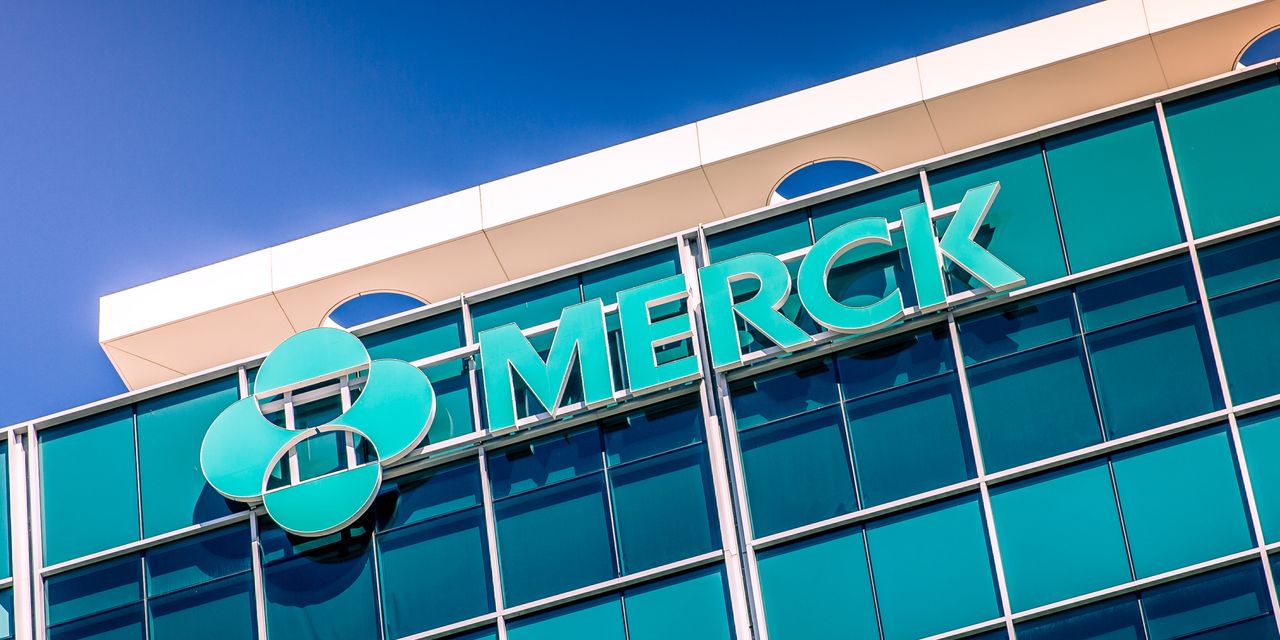The drug company
Merck
reported earnings Tuesday morning that surpassed past Wall Street expectations, signaling hope for a stock and a sector that have lagged behind the broader market this year.
In an interview with Barron’s, Merck (ticker: MRK) CFO Caroline Litchfield said sales of the company’s cancer treatments and vaccines were growing, and more M&A could be on the horizon.
“We have significant firepower left,” Litchfield said, referring to the company’s capacity to make more acquisitions. “Our company’s got a really strong balance sheet, and we have really strong earnings growth over the coming years, which will only lead to further increased capacity to invest.”
Merck reported sales of $15 billion for the quarter, beating the FactSet consensus estimate of $14.5 billion, and up 3% from the same quarter last year. The company lost $2.06 per share on a non-GAAP basis. Analysts had expected a larger loss of $2.18 per share, according to FactSet.
The reported loss for the quarter was due to the company’s $10.8 billion acquisition of Prometheus Biosciences, which closed in June. Following new Securities and Exchange Commission guidance, the company recorded the cost of Prometheus as a $4.02 per share charge to the second quarter’s non-GAAP earnings.
If not for the Prometheus acquisition, earnings for the quarter would have been $1.96 per share, up 4.8% from the same quarter last year.
Even as sales of the company’s Covid-19 antiviral Lagevrio fell to an almost negligible level, sales of the mega-blockbuster cancer drug Keytruda and the human papillomavirus vaccine Gardasil came in above the FactSet analyst consensus estimate, and were up sharply from the same quarter last year.
“The story is there’s real underlying momentum in our business,” Litchfield said. “That momentum is as a result primarily of great growth in oncology and vaccines.”
Merck said it now expects full-year 2023 sales of between $58.6 billion and $59.6 billion, up from its previous estimate of between $57.7 billion and $58.9 billion. It now expects non-GAAP earnings this year of between $2.95 and $3.05 per share.
Merck shares have slumped in recent months, down 7.6% since the end of April, a period in which the
S&P 500
has climbed 10%. Since the start of the year, Merck is down 3.9%, while the S&P 500 is up 19.5%.
The company is facing down the potential loss of U.S. exclusivity for Keytruda in 2028. In the meantime, however, the drug is besting sales expectations. Merck reported Keytruda sales of $6.3 billion in the second quarter, beating the FactSet consensus estimate of $5.9 billion.
Sales of Gardasil were up 47% from the same quarter last year, to $2.5 billion, which the company attributed to demand outside the U.S., notably in China.
“We’ve seen strong demand growth in just about every country around the world,” Litchfield said.
Sales Lagevrio were $203 million in the quarter, roughly in line with the FactSet consensus estimate of $193 million, and down from $1.2 billion in the same quarter last year. Lagevrio hasn’t been widely used in the U.S. Merck said that lower sales in Japan and a decision by the U.K. not to renew a supply contract for the medicine were behind the drop.
“Excluding that Lagevrio impact [and the impact of foreign exchange], the underlying [revenue] growth for our company is 14%,” Litchfield said. “That growth is really driven by phenomenal performance on Keytruda…Gardasil…as well as the launch of Vaxneuvance in pediatrics,” the company’s pneumococcal disease vaccine.
Questions have circled around whether the company will do more M&A, after the Prometheus deal this year. Various outlets reported last summer that Merck was in talks to buy the biotech
Seagen
(SGEN), which has a market value of $36 billion. Those talks failed, but no Merck acquisition target of that size has since emerged.
Litchfield said that the company was on the hunt for deals. “We have a portfolio of business development opportunities that we are reviewing, and it’s in many different areas,” she said. “When science and value align, we will act.”
The company is holding a call for investors at 8 a.m. on Tuesday.
Merck is among the companies that has sued the federal government in an effort to block implementation of a law that would allow the Medicare program to negotiate the prices of certain drugs. As Barron’s reported last week, the litigation effort seems to have decent odds of at least postponing implementation of the law, though its prospects are hard to predict.
Write to Josh Nathan-Kazis at [email protected]
Read the full article here












